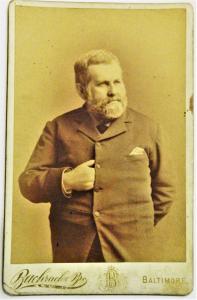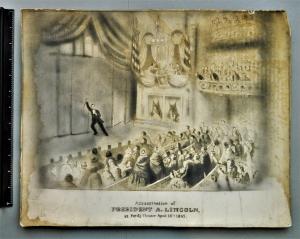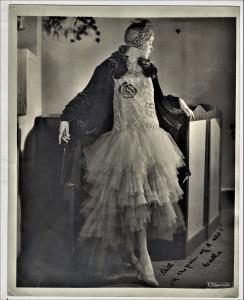Rare Nest Gallery Presents Ford Gresham Collection of American Theater History 1840-1970
Rare Nest Gallery Presents the Ford Gresham Collection of American Theater History 1840-1970: Spectacular, Unique, Historic Archive.
CHICAGO, IL, UNITED STATES, June 8, 2023/EINPresswire.com/ -- Rare Nest Gallery is honored to present a highly important archive of American theatrical history spanning 1840-1970. The Ford Gresham archive was collected by and passed down through four generations, beginning with impresario John T. Ford, owner of the landmark Ford’s Theatre in Washington, D.C., and ending with a direct descendant. The archive comprising over 1,600 pieces includes substantial examples of 19th and 20th century photography, manuscripts, autographs, scrap books, correspondence (with notables including Samuel Clemens), contracts, press clippings, birth and death certificates and much more. Physical artifacts include ceramics, engraved silver and posters. Together, the Ford Gresham Collection illuminates the professional and personal lives of a dynasty of American theater.
Originating in the Baltimore home of John T. Ford, the collection was added to by Ford’s daughter Martha Ford Gresham and her spouse Herbert Gresham, both of whom were deeply involved in 19th century American and British theatre. The third generation – sister and brother Edith Ford Gresham and Harry Ford Gresham – accumulated in a modern fashion.
Rare Nest Gallery has cataloged and researched the collection and has provided basic stabilization. Gallery Director Keith Bringe reflects, "Collections like the Ford Gresham have become quite rare and illuminate not only theater history but American history, as a whole."
Rare Nest Gallery hopes to place the collection at auction in the fall or sell it in its entirety to a collection.
John T. Ford
1829, Baltimore – 1894, Baltimore
Ford was born on April 16, 1829. After completing school, he left Baltimore to work for his uncle, a tobacco merchant in Richmond, Virginia. Ford did not find the work to his liking and soon found employment with a bookseller in the city. When he tired of that, he returned to Baltimore and found work as the road manager for George Kunkel’s Nightingale Minstrels in 1851. After a successful tour with the company, Ford, Kunkel and another partner leased the Holliday Street Theatre in Baltimore and Ford was thereafter a theater owner, manager and promoter. In time, Ford would own the Holliday Street Theatre as well as theaters in Richmond, Philadelphia and three in Washington, D.C., including the one to which his name is most closely associated, on Tenth Street.
It was there that John Wilkes Booth assassinated Abraham Lincoln. Ford knew most of the best stage performers of his day and was well-acquainted with the Booth family. Because of his association with the Booths, his management of the theater and perhaps because he was from Maryland, home of most of the assassination conspirators, Ford and two brothers were arrested in the wake of the assassination. The Federal government held him for 39 days and seized Ford’s Theatre. His close association with the events of the assassination would be linked to Ford for the rest of his life. In the end, the Federal government compensated Ford for the loss of his theater and fully exonerated him, so he was able to continue his success in the theater world. Important items related to the Assassination in this collection include a large, partially hand-augmented illustration, correspondence from his daughter during his unlawful incarceration and cartes de visite of Ford and his wife.
Martha Ford Gresham
1872, Baltimore – 1923, Baltimore
Growing up in her father’s theaters gave Martha Ford a rare vantage point and opportunity to rub elbows with the prominent theatrical figures of the 19th and early 20th century. Evidence of this proximity is present throughout her sub-collection. Martha’s autograph book, dedicated photographs and a poem composed by Edwin Booth about her as a toddler demonstrate convivial relationships with the stars. From her teen years, Martha’s father worked assiduously to develop and promote her career and from at least 1894 Martha developed a repertory with renowned Shakespearian actor Creston Clarke (nephew of the Booth brothers). Martha received positive reviews as Ophelia in Hamlet and as Juliet. From 1890, Martha became known for her recitation of Francis Scott Key’s “Star Spangled Banner”. She was asked to recite at fairs and festivals across the country, including the 1893 World’s Columbian Exposition in Chicago. Also in the 1890’s, possibly at Daly’s Theatre in New York, Martha met Herbert Gresham, a London-born stage manager and actor. After her marriage to Herbert, Martha seems to have retired from the stage to raise her three children.
Edith Ford Gresham
1897, Manhattan – 1976, Riverdale
Edith Gresham’s incredibly diverse career ranged from prep school performances (as Romeo) to Broadway to radio and television (The Phil Silvers Show, others) to film. Her breakthrough role was playing Sadie Clarence in 39 East by Rachel Crothers (in 1919 on Broadway and reprised in a lost silent film in 1920). Edith began as an ingénue eventually settling in as a go-to character actress. She was often called upon to replace short-lived original performers. Edith helped define the roles of Aunt Eller in Oklahoma (Broadway and travelling) and the outlandish Countess de Lage in Clare Booth Luce’s classic The Women. In all, Edith has at least twelve Broadway credits through 1966 (The Caucasian Chalk Circle).
Considering her grandfather and father’s theatrical management it is somewhat surprising that Edith was proud of her participation in the Actor’s Strike of 1919 which led the way for labor reforms and helped to cement Actors Equity as a bargaining and governance powerhouse in the entertainment industry.
During the period of World War II and after, Edith organized and supported charitable programs for refugees and promoted bond drives. Her sub-collection includes numerous receipts and moving letters of thanks to the Oklahoma company from war survivors and refugees.
A dedicated career actress, Edith remained single throughout her life.
Keith Bringe
Rare Nest Gallery Chicago
+1 708-616-8671
keith@rarenestgallery.com
Visit us on social media:
Instagram
Legal Disclaimer:
EIN Presswire provides this news content "as is" without warranty of any kind. We do not accept any responsibility or liability for the accuracy, content, images, videos, licenses, completeness, legality, or reliability of the information contained in this article. If you have any complaints or copyright issues related to this article, kindly contact the author above.



